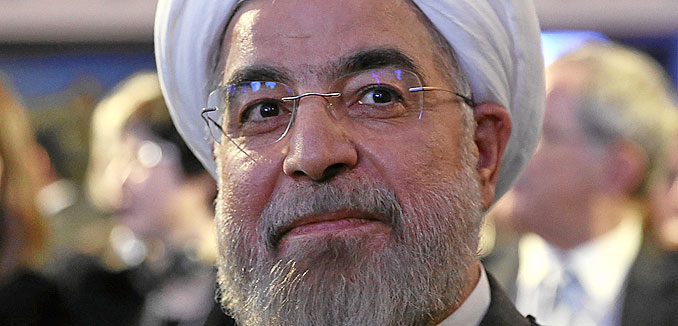Iranian President Hassan Rouhani and the Islamic Revolutionary Guard Corps (IRGC) leaders are embroiled in a war of words over some of the key issues that put Tehran at the top of the West’s agenda.
Supreme Leader Ali Khamenei is trying to bridge the divide between the parties.
Iranian websites reported that tensions between those in power peaked when military officials hurled curses towards Rouhani, claiming he “sold the Islamic Republic to Americans.”
According to an in-depth report by al-Hayat (Arabic link), Iran faces several crises, contributing to the tension between the leading elites. Schisms have arisen over the expansion of ISIS, the ongoing nuclear negotiations and the possibility of a unilateral declaration of independence by Iraqi Kurdistan. The weakening of Bashar al-Assad and Hezbollah in Syria and the battle to become Khamenei’s successor are also contributing to the disharmony.
The differences of opinion inside the Iranian government about the direct interference in Iraq deepened recently. Rouhani requested a reduction in military spending and one of his close associates claimed there is no need for the presence of Iranian forces in Iraq. This statement angered senior officials in the Revolutionary Guards, with a senior officer from the Basij militia saying Iran will not hesitate to act in Iraq. On the military front, Iran supports not only the Iraqi army, but also armed Shiite militias in their fight against ISIS, according to analyst Lina al-Khatib.
More tensions surfaced in recent days, following the death of Ayatollah Mohammad Reza Mahdavi Kani, the president of the Assembly of Experts, the highest religious authority in Iran, which oversees the activities of the supreme leader. The country’s conservatives are now worried the moderates will “take over” the Council. According to a-sharq al-Awsat (Arabic link), if these concerns will be realized, it will cause a tear in the balance of power, which Khamenei has sought to maintain during the past 25 years.
On the nuclear issue, senior commanders of the IRGC, which was founded 35 years ago to defend the system of clerical rule in Iran, criticized the nuclear talks with the West. They said the talks did not, and will not, contribute anything to the country.
Despite allowing the nuclear talks with the West, Khamenei has recently re-emphasized Iran’s “red lines” including an expanded enrichment capacity making an agreement even less likely.
[Photo: WEF / flickr]




